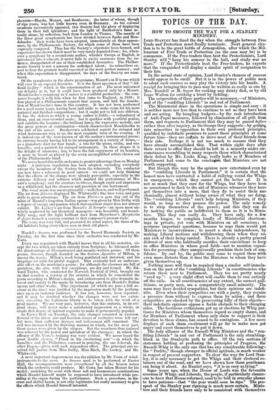Handel's Samson was performed by the Sacred Harmonic Society on
Tuesday, for the first time since their orchestra was conducted by Mr. Costa.
Every one acquainted with Handel knows that in all his oratorios, ex- cept the two which are taken entirely from Scripture, he laboured under the disadvantage of ill-constructed and meanly-written poems. Of these poems, Samson, though founded on the Samson Agonistes of Milton, is among the worst ; Milton's work being mutilated and distorted, and his language set aside for pitiful doggrel. This evidently had an unfavour- able effect on the musician's genius ; for although the choruses are full of grandeur, the airs, with few exceptions, are dry and formal. Mr. Ed- ward Taylor, who conducted the Norwich Festival of 1842, brought out on that occasion a version of the oratorio in which he remodelled the poem according to Milton's design, and endeavoured to give dramatic in- terest and variety to the music by introducing airs from Handel's Italian operas and other works. This experiment (of which we gave a full ac- count at the time) was justified by the impression made by the perform- ance upon an immense audience. It has not, however, been repeated ; and it may be doubted whether the changes were not too exten- sive, exceeding the legitimate liberty to be taken with the work of a great master. We are very sure, however, that this oratorio, in its ori- ginal shape, will never make a satisfactory impression as a whole, or create that degree of interest requisite to make it permanently popular.
In Exeter Hall on Tuesday, the only changes consisted in excision. Several of the driest airs and heaviest scenes of recitative were left out ; but more than sufficient dryness and tediousness still remained. The evil was increased by the drawling manner in which, for the most part, those scenes were given by the singers. But the weariness thus induced was relieved by the power and splendour of the choruses ; in which the efficacy of Mr. Costa's training was very evident. We never heard the great double chorus, " Fixed in his everlasting seat"—in which the Israelites and the Philistines contend in praising, the one Jehovah, the other Dagen—given with such stupendous effect. The principal airs re- ceived full justice from Miss Dolby, Miss Birch, Mr. Loekey, and Mr. Whitworth.
A most important improvement was the addition by Mr. Costa of wind- instruments to the score. As Samson used to be performed at Exeter Hall, the accompaniments were strengthened by all the brazen noises which the orchestra could produce. Mr. Costa has taken Mozart for his model ; enriching the score with those soft and harmonious combinations which Handel himself might be supposed to have introduced while pre- siding at the organ during the performance. Such a procedure, in dis- creet and skilful hands, is not only legitimate but really necessary to give the effects which Handel himself intended.


























 Previous page
Previous page